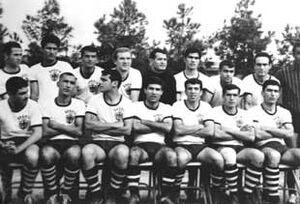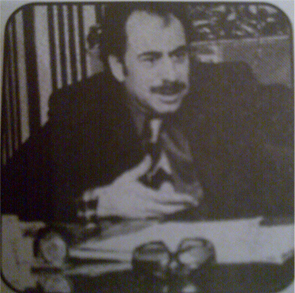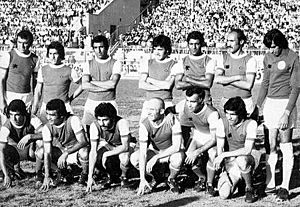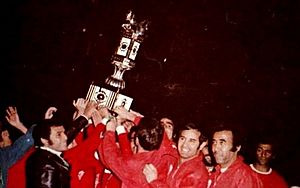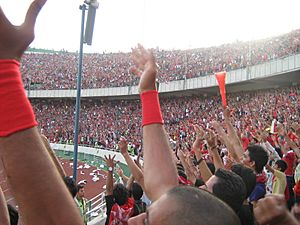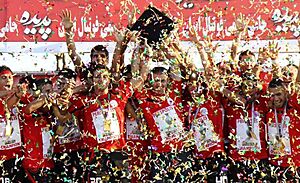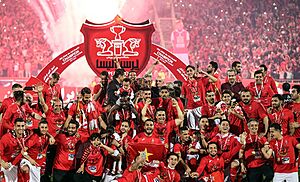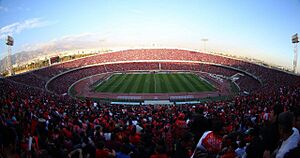History of Persepolis F.C. facts for kids
The history of Persepolis F.C. tells the story of this famous football club from its start in 1963. Persepolis F.C., also known as the Red Army, is based in Tehran, Iran.
The club was founded in 1963 by Ali Abdo. Since 1968, Persepolis has been in the top football league in Iran. In its early days, Persepolis also had teams for bowling, basketball, and volleyball. The club plays its home games at Azadi Stadium, which it has used since 1973. They play in the exciting Tehran derby against their big rivals, Esteghlal. This match is one of the biggest in Asia and is always watched by many Iranian football fans. The Asian Football Confederation says Persepolis is the most popular football club in Asia.
Contents
Shahin F.C. (1942–1967)
Shahin was a football club started in 1942 by Dr. Abbas Ekrami, a teacher. He created the club with young students, following a special motto:
اول اخلاق، دوم درس، سوم ورزش
First, good manners; second, education; third, sports.
Shahin helped many talented players become stars. Some of these players were Parviz Dehdari, Masoud Boroumand, Homayoun Behzadi, Jafar Kashani, Hossein Kalani, and Hamid Shirzadegan. Many of them also played for the Iran national football team. Because of these great players, Shahin became very popular in the 1960s. However, its popularity was seen as a problem by the Iran Football Federation and a major sports newspaper. This disagreement grew, and on July 9, 1967, Shahin F.C. was officially closed down. After this, many fans stopped going to league games. Other clubs tried to sign Shahin's players.
Club's Early Years (1963–1969)
The Persepolis Athletic and Cultural Club was founded in 1963 by Ali Abdo. Abdo was a championship boxer who had returned to Iran from the United States.
Persepolis F.C. began the 1968 season with Parviz Dehdari as their manager. Even though there were efforts to spread Shahin's players to different clubs, Parviz Dehdari and Masoud Boroumand helped most of the Shahin players join Persepolis. This helped Persepolis gain the same popularity that Shahin had. At first, the team was not very strong and played in the country's second division. The best player at that time was Mahmoud Khordbin.
The club played a friendly match against Jam Abadan, a respected team, using four former Shahin players. After this match, the rest of the Shahin players joined Persepolis. That year, no league competition was held because many teams had been dissolved. Instead, a 44-team tournament took place. Persepolis, along with Pas, Taj, and Oghab, finished at the top of their group.
The next year, Persepolis became the first Iranian club to play in the Asian Champion Club Tournament in Thailand. However, they were not successful and were knocked out in the group stage.
Takht Jamshid Cup (1969–1979)
In 1969, Mahmoud Khayami, the owner of the Iran Universal car factory and a big fan of Shahin, wanted to make his own football team better. He talked with Persepolis and managed to get almost all the former Shahin players to join his new team, Paykan Tehran F.C.. Paykan won the championship that year. However, these players moved back to Persepolis at the end of the season.
In 1971, Persepolis won its very first championship in the Iranian League. They had an amazing season, winning 13 games and drawing 1 out of 14 matches. In 1972, Ali Abdo announced that Persepolis would be the first professional football club in Iran. The club did not play in the local league and only played against foreign teams. A few months later, it became an amateur club again. The next year, the Takht Jamshid Cup was created. Persepolis won the first Takht Jamshid Cup in 1973 and won it again in 1975. In the third year of the Takht Jamshid Cup, Persepolis lost only two out of thirty matches. Persepolis is the most successful club in the Takht Jamshid Cup, winning two titles and finishing as runner-up three times.
Success Under Difficult Times (1979–1990)
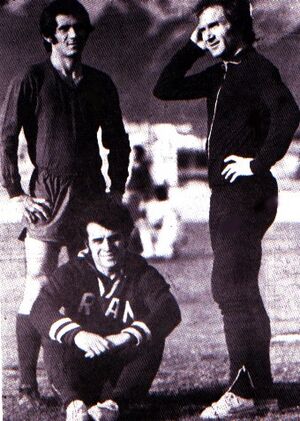
When the Iranian Revolution happened in 1979, Ali Abdo went back to the United States. Even though Persepolis won the Espandi Cup, the club faced many challenges, and many old players did not return. The club's property was taken over by government organizations, and the club was put under the control of Iran's Physical Education Department.
In 1981, the Physical Education Department wanted to change the club's name. However, the club's officials, players, and fans were against this. As a protest, the team did not show up for a match against Homa in the Tehran league. They lost the match 3–0 by default, and Homa became champion. In 1986, the club was taken over again and renamed Azadi (meaning "freedom"). The players said they would not play if the name changed. After a short time, the organization no longer wanted the club, and it was taken over by the Physical Education Department again. On February 16, 1987, the Physical Education Department renamed the club Pirouzi (meaning "victory") with the players' agreement. However, fans still call the team by its original name, Persepolis. On April 10, 2012, the club chairman Mohammad Rouyanian announced that the club would officially only be known as Persepolis.
In the 1980s, the club only played in the Tehran League and various knockout tournaments. Persepolis was very successful during this time and remained popular. They won the Tehran League five seasons in a row. During this period, Ali Parvin was both a player and the manager.
A New Beginning (1990–2001)
The 1990s were a fantastic decade for Persepolis. The team won four league championships and two Hazfi Cups. They had many great players and gained even more support from fans. At one point, more than six Persepolis players were starting for Iran's national team. The team won the national championship in the 1995–96 season. They were 10 points behind Bahman at one point but came back to finish first, six points ahead of the runner-up. They won the league again the next season, also finishing six points ahead. They were stopped by the Korean team Pohang Steelers in the semi-finals of the Asian Champions' Cup. Persepolis finished third, beating Iraq's Al-Zawraa.
The next season, they played well again. However, because they had many players on the national team and were also playing in the Asian Champions' Cup, they had to withdraw from the league. Poor scheduling by the football authorities led to this problem. This stopped Persepolis from possibly winning a third league championship in a row. Persepolis also didn't have much luck in the Asian Champion's Cup, losing in the semi-finals again, this time to Chinese club Dalian Wanda. They also lost the third-place match to Al-Hilal.
Many people believe the Persepolis teams from 1996–97 and 1997–98 were among the best Iranian clubs ever. National team players and future stars like Ahmadreza Abedzadeh, Khodadad Azizi, Karim Bagheri, Ali Daei, Mehdi Mahdavikia, Mehrdad Minavand, and Ali Karimi played for the club during those years.
After the World Cup 1998, several of Persepolis' best players moved to European clubs. However, Persepolis still had a talented team. Future national team members Ali Karimi and Hamed Kavianpour joined the team around this time. They won the 1998–99 championship and the Hazfi Cup that season. They also won the 1999–2000 league championship, finishing third again in the Asian Champions Cup. This was their last championship in the Azadegan League era.
Most of Persepolis' championships during this time were won while Ali Parvin was the manager and Amirali Abedini was the chairman.
IPL Era (2001–present)
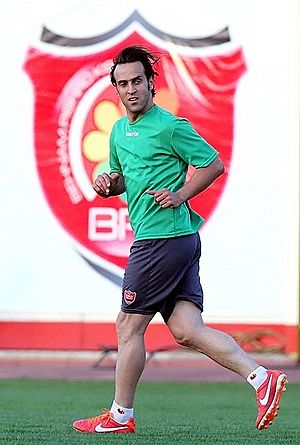
Persepolis joined the new IPL (Iran Pro League) hoping to be champions again. Near the end of the season, they were in a very close race with their rival Esteghlal. Esteghlal was two points ahead on the final day. However, Esteghlal lost to Malavan, and Persepolis won 1–0 against Fajr Sepasi. This gave Persepolis a one-point lead and another championship. Their 2001–02 season championship made them the first-ever IPL champions. The 2002–03 season was very tough, and Persepolis finished third, far behind the winners, Sepahan. They also struggled in the new AFC Champions League, not making it past the group stage.
When Akbar Ghamkhar became the club chairman, he made changes to improve the team. He made player salaries public, which upset Parvin, who was the highest-paid player. Ghamkhar hired coach Vinko Begović and signed several well-known players. Persepolis started the 2003–04 season very well, but things got worse. Begovic left, and German manager Rainer Zobel was brought in. Parvin returned as technical director. The club finished fifth in the 2004–05 season.
Ghamkhar was replaced by Hojatollah Khatib, who decided to bring back Parvin. The club faced big money problems because of past spending. Persepolis finished the 2005–06 season in ninth place, their lowest ever. Parvin left the club in February 2006 after a 4–2 loss to Fajr Sepasi at Azadi Stadium. After the game, fans were very upset with Ali Parvin and the players.
Khatib resigned, and Mohammad Hassan Ansarifard became the new chairman. Arie Haan was hired as the new manager and helped the team reach the 2005–06 Hazfi Cup final. However, he was fired just before the 2006–07 season began. Turkish manager Mustafa Denizli joined the team on August 17, 2006. The cup final was his first match, but Denizli could not help the club win the Hazfi Cup in 2006. Winning this cup was important for the team to enter the Asian Champion's League and get financial benefits.
The club did not win the Hazfi Cup the next year either, losing to Sepahan in the semifinals in June 2007. The club finished third in the IPL 2006–07, and Denizli left the club after Ansarifard resigned in June 2007.
Afshin Ghotbi: The Emperor's Reign
Habib Kashani became the club chairman in June 2007 and chose Afshin Ghotbi as head coach for the 2007–08 season. Ghotbi promised to lead Persepolis to the IPL championship. They started the IPL with a 3–2 win over Sanat Naft. Persepolis was undefeated until the 17th round, where they lost 2–1 to Sepahan. In January 2008, the Iranian Football Federation said Sepahan would lose five points because of an injury to a security guard caused by their fans. This was later reduced to three points. Persepolis also lost six points from FIFA because they hadn't paid some former players. This put Persepolis behind Sepahan in the standings. Near the end of the season, Sheys Rezaei and Mohammad Reza Mamani were removed from the team for poor behavior. Both Habib Kashani and Mahmoud Khordbin had heart attacks during this stressful time. Persepolis cut Sepahan's seven-point lead to just two points by the last game of the season.
In the final week, Persepolis beat Sepahan when Sepehr Heidari scored a goal in the 96th minute. This happened in front of over 110,000 fans at Azadi Stadium. This win gave Persepolis its second IPL championship and a spot in the Asian Champions League. At the 2007–2008 Golden Ball award ceremony, Persepolis won the Team of the Year title, Afshin Ghotbi won Manager of the Year, and Mohsen Khalili won Player of the Year.
Ghotbi's contract ended, and he decided to leave. His assistant, Hamid Estili, was close to becoming manager. However, Kashani and other club officials resigned due to disagreements with the Iran Physical Education Department. Dariush Mostafavi became the new chairman and promised to bring Ghotbi back. Negotiations worked, and on July 4, 2008, Ghotbi signed a two-year contract. But Ghotbi had many problems with Mostafavi and resigned on November 19, 2008. He became emotional when talking about leaving Persepolis and the fans who called him "Emperor."
Ghotbi left the team in the middle of the season after a series of losses and later became the head coach of the Iran national football team.
Due to poor management, Persepolis had not performed well in recent seasons. The choice of less experienced coaches and signing lower-quality players made the team's struggles worse. After Ghotbi resigned, his assistant Afshin Peyrovani became the temporary head coach. He led the team for 11 matches but was replaced by former Portugal and Saudi Arabia manager, Nelo Vingada. Vingada's contract ended at the end of the season.
Daei's Years
After Vingada was fired, Zlatko Kranjčar, a former manager for Croatia and Dinamo Zagreb, was hired. But he was soon replaced by former Persepolis and Iran national football team captain, Ali Daei. At the end of the 2009–10 season, Persepolis finished fourth in the league but became Hazfi Cup champions. In the Hazfi Cup final, Persepolis beat Azadegan League team Gostaresh Foolad Tabriz 4–1 over two games. This qualified them for the 2011 AFC Champions League. In the 2010–11 season, Persepolis finished fourth in the league and was knocked out in the group stage of the 2011 AFC Champions League. However, at the end of the season, Persepolis won the 2010–11 Hazfi Cup again, beating rivals Sepahan, Foolad, and Malavan. The club chose Hamid Estili as Daei's replacement that day. Under Daei's management, Persepolis won two trophies in a row for the first time in 13 seasons.
After Daei resigned, Hamid Estili, Mustafa Denizli, Manuel José, and then Yahya Golmohammadi managed Persepolis. This was a record four head coaches in just two seasons. Golmohammadi led Persepolis to the final of the Hazfi Cup, but they lost to Sepahan in a penalty shootout. After the Hazfi Cup, Golmohammadi announced he would not manage Persepolis the next season.
However, Daei returned to the club and signed a three-year contract before the start of the 2013–14 season. Under Daei, Persepolis finished second with 55 points, just 2 points behind champions Foolad. Persepolis earned a spot in the AFC Champions League again after two years.
After a poor start to the 2014–15 season, which left Persepolis in 9th place, Daei was fired and replaced by Hamid Derakhshan. Fans criticized Derakhshan's performance.
The Ivanković Era

On April 5, 2015, Hamid Derakhshan resigned as head coach, and Hossein Abdi temporarily took over. The next day, former Iran national football team manager Branko Ivanković was named the new head coach.
On May 15, 2015, Ivanković won his first Tehran derby with a 1–0 victory over Esteghlal. Later that week, on May 19, 2015, Persepolis beat Al-Hilal 1–0 in the first game of the AFC Champions League Round of 16. However, in the second game, they lost 3–0 to Al-Hilal and were knocked out.
After Mohammad Nouri left, the club named Hadi Norouzi as captain for the 2015–16 season. Persepolis was very active in signing new players that summer, including Iranian international Ramin Rezaeian, Croatian defender Luka Marić, and Honduras international Jerry Bengtson.
On October 1, 2015, the club captain Hadi Norouzi sadly passed away in his sleep at the age of 30, likely from a heart attack. His death deeply shocked Iranian sports.
After Hadi Norouzi's death, Persepolis improved their performance. A long unbeaten run pushed them into the top 3 midway through the season. After a memorable 4–2 win against Esteghlal in the Tehran derby, the team moved into first place. However, after a loss to Naft Tehran on April 28, the team dropped to third place. Persepolis won the next week's match against Gostaresh Foolad and moved into second place, behind Esteghlal Khuzestan only by goal difference. A win on the final day, May 13, 2016, against Rah Ahan was not enough for Persepolis, as Esteghlal Khuzestan also won and became champions of the Persian Gulf Pro League 2015–16.
Before the 2016–17 season, Persepolis added national team players Alireza Beiranvand, Jalal Hosseini, and Vahid Amiri. Persepolis started the season strong and never dropped below third place. They set records for the fewest goals conceded and most points earned after 17 weeks in a Persian Gulf Pro League season. On April 15, 2017, Persepolis became the champions of the season with three weeks left. After beating Machine Sazi, Persepolis claimed its third championship in the Persian Gulf Pro League and its 10th championship overall. Persepolis defended its championship in the Persian Gulf Pro League 2017–18 and won the Super Cup.
On May 30, 2017, Persepolis made history again by reaching the Quarterfinals of the AFC Champions League. They beat Qatari club Lekhwiya 1–0 in the Round of 16. This was the first time Persepolis reached the Quarterfinals in the current Champions League format. Persepolis then beat Saudi club Al Ahli 5–3 over two games to reach the Semifinals. There, they lost to Al Hilal 6–2 over two games. The following year, Persepolis reached the AFC Champions League Final in 2018 but lost 2–0 in the first game. Persepolis drew 0–0 with Kashima Antlers of Japan in the second game of the AFC Champions League. On May 16, 2019, Branko Ivanković made more history with Persepolis by winning a third consecutive championship in the Persian Gulf Pro League. However, he left the club at the end of the season after 4 years, having won a record 7 trophies for a foreign coach.
Golmohammadi's Return
On January 13, 2020, Golmohammadi was named Persepolis F.C. head coach, replacing Argentine Gabriel Calderón. This was Golmohammadi's second time managing Persepolis F.C. At that moment, he took charge of a team that was leading the Persian Gulf Pro League by 3 points. “This is a huge honor,” Golmohammadi said in his first talks as Persepolis' new coach.
Persepolis, now with Golmohammadi, reached the ACL final match for the second time in just three years. They aimed to end a nearly 30-year wait for a continental trophy for Iranian teams. However, a lack of money and sponsorship problems led to key players leaving. Persepolis became the Asian runner-up again.
Home Ground
When Persepolis F.C. was first created, the sports club already had several buildings. These included gyms, swimming pools, and bowling alleys at the Bowling Abdo Complex. This place in northern Tehran hosted the 1976 Bowling World Cup. After the revolution, it was renamed Shahid Chamran Bowling. At first, there was no stadium for the football team. Ali Abdo bought land in the Ekbatan area of Tehran and built a stadium there. At the time, it was called Apadana Stadium. Persepolis played only one game at this stadium because of poor seating arrangements and a lack of cooperation with other Iranian clubs. Persepolis only used the stadium for training.
Around the mid-1970s, Abdo had to sell much of the club's property to keep it running due to financial problems. He sold Apadana Stadium to Rah Ahan for 200,000 Tomans in 1975. Apadana Stadium is now called Rah Ahan Stadium. Because of the Iranian Islamic Revolution in 1979, the club's properties were taken over by government organizations. Bowling Abdo, the club's original headquarters, burned down, and Abdo returned to the United States.
Before Azadi Stadium was built in 1971, Persepolis played its matches at Amjadieh (Shahid Shiroudi) Stadium. They have played almost all their home games at Azadi Stadium. The only exception was during the 2002–03 season, when they played all but two of their home matches at Tehran's Takhti Stadium while Azadi Stadium was being renovated.
In mid-2006, Persepolis thought about buying Shahre Ghods Stadium. However, the deal did not happen because of Persepolis' financial problems and the stadium's long distance from the city center.
Images for kids
-
Group photograph of Persepolis in February 2018


